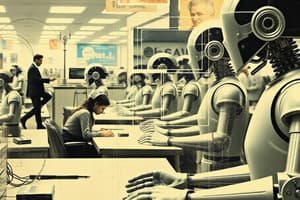Podcast
Questions and Answers
What did Elon Musk predict about the future of work?
What did Elon Musk predict about the future of work?
- Robots will take over all human jobs
- People will work longer hours in the future
- Artificial intelligence will lead to a future where no one has to work (correct)
- Remote work will become extremely unpopular
Why did some British companies experiment with a four-day working week after the COVID-19 pandemic?
Why did some British companies experiment with a four-day working week after the COVID-19 pandemic?
- Due to a decrease in productivity during the pandemic
- Because it aligned with predictions and was popular (correct)
- To increase the total number of working days
- To reduce working hours significantly
What is the opinion of University of Cambridge professor Brendan Burchell regarding predictions for the future of work?
What is the opinion of University of Cambridge professor Brendan Burchell regarding predictions for the future of work?
- He is optimistic and believes in significant reductions in working time
- He believes that everyone will eventually work remotely
- He is skeptical and notes historical challenges in reducing working time (correct)
- He thinks that AI will replace all jobs without new ones emerging
According to Business editor Andrew Palmer from The Economist, what is the impact of AI on jobs?
According to Business editor Andrew Palmer from The Economist, what is the impact of AI on jobs?
What does the phrase 'take it with a pinch of salt' mean?
What does the phrase 'take it with a pinch of salt' mean?
What does the term 'dystopian' refer to?
What does the term 'dystopian' refer to?
Match the job with the correct description.
Match the job with the correct description.
Flashcards are hidden until you start studying
Study Notes
- Predictions for the future of work have been made throughout history, including ideas like a 'smell-o-vision' TV and a miracle pill that cures all diseases from the 1930s.
- Elon Musk predicted that artificial intelligence will lead to a future where no one has to work, but making accurate predictions about the future is challenging.
- During the COVID-19 pandemic, many were forced to work from home, aligning with predictions that everyone will eventually work remotely.
- Some British companies experimented with a four-day working week after COVID, with 92% of them planning to continue this shorter work week due to its popularity.
- University of Cambridge professor Brendan Burchell is skeptical about predictions for the future of work, noting that historically, dramatic reductions in working time have not materialized.
- Business editor Andrew Palmer from The Economist believes that while AI may replace some jobs, new jobs will also emerge, but timing and coordination present challenges.
- Vocabulary learned includes "take it with a pinch of salt" (doubt accuracy), "track record" (past achievements or failures), "come to pass" (happen), "dystopian" (imagining a nightmarish future), "get rid of something" (remove unwanted thing), and "crop up" (appear unexpectedly).
Studying That Suits You
Use AI to generate personalized quizzes and flashcards to suit your learning preferences.




